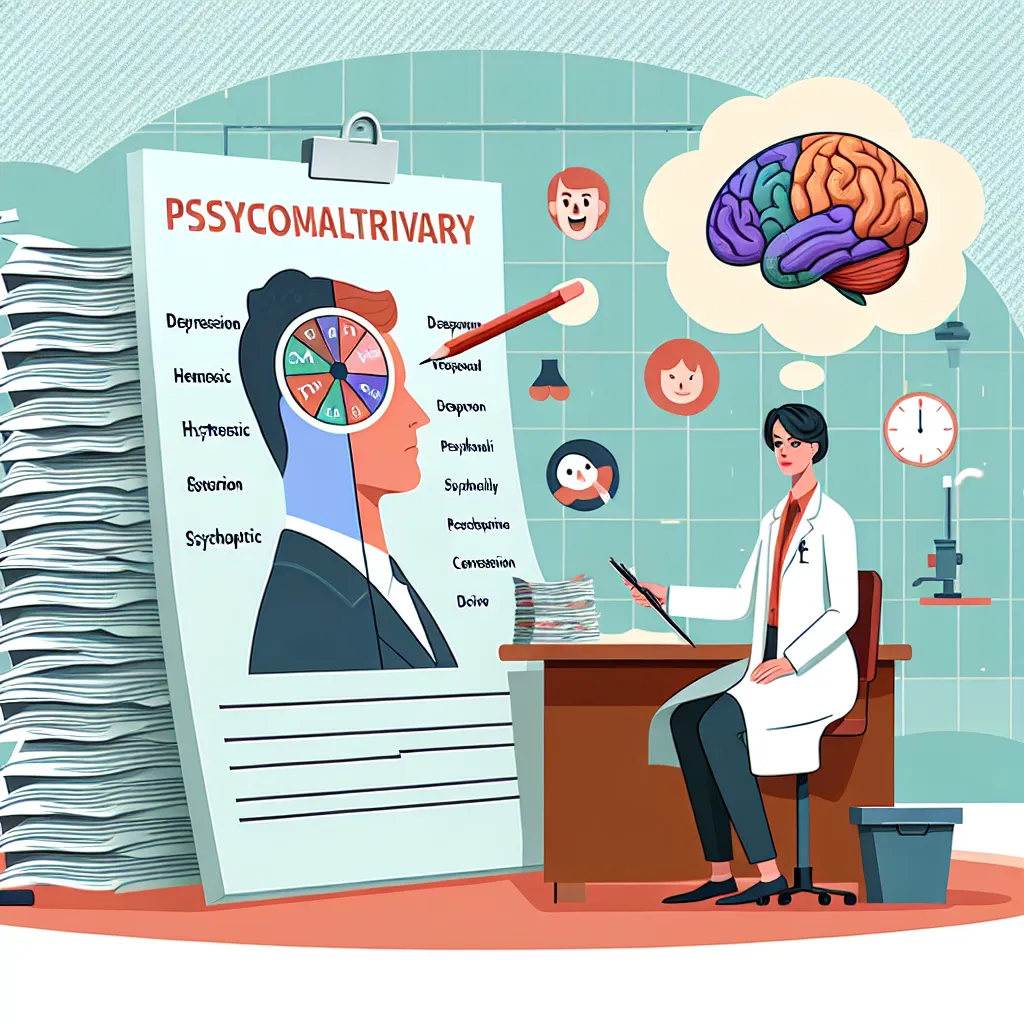Understanding the Role of MMPI in Psychological Diagnostics
The field of psychological diagnostics has been revolutionized by the Minnesota Multiphasic Personality Inventory (MMPI), the most widely used and researched standardized psychometric test of adult personality and psychopathology. Developed in the late 1930s by psychologist Starke R. Hathaway and psychiatrist J. C. McKinley at the University of Minnesota, the MMPI has evolved into an essential tool for mental health professionals. This article will delve into the role of MMPI in psychological diagnostics, its development, and its application in contemporary clinical settings.
The Development of MMPI
The initial version of the MMPI was published in 1943 and contained over 500 true-or-false statements that were designed to assess various psychological conditions. It underwent extensive research and standardization and was revised in 1989 as the MMPI-2, with a version for adolescents (MMPI-A) following in 1992. The inventory was developed using an empirical approach, meaning that the test items were selected based on their ability to discriminate between different psychiatric diagnoses.
Understanding How MMPI Works
The MMPI-2 consists of 567 statements that the test-taker must rate as true or false in relation to themselves, which assesses a broad range of psychological conditions. The test generates scores on 10 primary clinical scales, which represent distinct psychological conditions such as depression, paranoia, and schizophrenia. Additionally, it includes validity scales meant to detect potential response biases, such as a tendency for the test-taker to present themselves in an overly favorable manner or to exaggerate symptoms.
MMPI Validity and Reliability
Validity and reliability are critical components for any psychological test. The MMPI enjoys high levels of both, as evidenced by decades of research. Its ability to accurately discern between various psychopathologies makes it a gold standard in the arena of psychological diagnostics. Its reliability, or the consistency of results across different occasions, further bolsters its use in diverse settings; the MMPI-2 has been translated into numerous languages and adapted culturally to ensure its effectiveness across different populations.
Using MMPI in Clinical Assessments
Mental health professionals utilize the MMPI to assist in the formulation of diagnostic impressions and treatment plans. It helps with identifying personality structures and psychopathology, thus providing a comprehensive view of the patient’s mental health status. Its use extends beyond mere diagnostics; the results inform treatment strategies, predict therapy outcomes, and assist in the monitoring of changes over time, making the MMPI an indispensable tool throughout the treatment process.
Applications of MMPI in Various Settings
The utility of the MMPI goes beyond general clinical practice. It plays a crucial role in forensic evaluations, often informing court decisions regarding competence, criminal responsibility, or custody disputes. In occupational settings, the MMPI-2 is employed to assess job candidates, particularly in high-stakes professions. Its validity and comprehensiveness also make it a favored choice for psychological research and neuropsychological evaluations.
Advancements and New Versions: MMPI-2-RF and MMPI-3
Keeping pace with advances in the field, newer versions such as the MMPI-2-RF (Restructured Form) and the recently released MMPI-3 seek to streamline the diagnostic process with fewer items and updated norms. These versions ensure the instrument’s continued relevance, embracing current clinical perspectives and demographic changes.
Interpreting MMPI Results
Interpreting MMPI results is a complex process that requires thorough training and an understanding of the instrument’s nuances. A comprehensive analysis includes examining patterns across scales, cross-validating findings with other data, and appreciating the context of the individual’s life. Results should integrate with clinical interviews, observations, and other assessment tools, as no test functions in isolation.
Challenges and Limitations
Despite its widespread use, the MMPI is not without its challenges. Misinterpretation of results, overreliance on the test scores without considering the full clinical picture, and potential cultural biases pose potential risks. It is imperative for practitioners to remain cognizant of these limitations and approach MMPI results critically and in conjunction with a holistic view of the individual.
Training and Competence in MMPI
Given the complexity of the MMPI, appropriate training and competence in its administration and interpretation are essential. Professionals need to stay abreast of developments in the field, including the latest research and best practice guidelines for its use. Continuing education is vital to ensure the MMPI’s role in yielding valid and ethically sound outcomes.
Ethical Considerations
Ethical use of the MMPI is paramount. Practitioners must uphold confidentiality, obtain informed consent, and use the MMPI results to enhance client well-being. They must also be sensitive to cultural variances and avoid discriminatory practices, ensuring that the MMPI is employed fairly and without bias.
The Future of MMPI
The MMPI continues to evolve, with ongoing research enhancing its application and effectiveness. It remains a cornerstone of psychological assessment, while its adaptability to technological advancements, such as computerized administration and scoring, secures its place in the future of psychological diagnostics.
MMPI’s Enduring Legacy
The MMPI’s enduring legacy is a testament to its utility and robustness as a psychological instrument. Its impact on the field of psychology is immeasurable, providing clinicians with a powerful tool to understand complex human behaviors and mental health conditions. Through its rigorous standardization, comprehensive scales, and ongoing refinement, the MMPI is a steadfast ally in the quest for psychological understanding and effective interventions.
Conclusion
In summary, the role of the MMPI in psychological diagnostics is multifaceted. It serves as an invaluable resource for mental health professionals seeking to diagnose, treat, and understand the vast spectrum of human psychological experiences. As the field of psychology continues to grow and develop, the MMPI remains a foundation in the assessment and study of adult psychopathology, combining a legacy of reliability with the promise of future advancements. The MMPI’s role in fostering greater insights into mental health and providing support for therapeutic decisions showcases its enduring importance in the realm of psychological diagnostics.



Leave a Comment